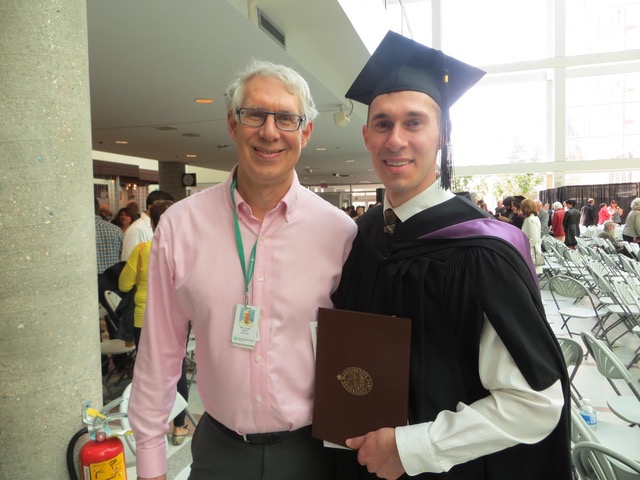Local News
Eyal Kraut: continuing the family medical tradition

By GERRY POSNER When you talk medicine and family connections to medicine, one of the families you have to think of almost immediately is the Berbrayer- Kraut family. There are three generations of doctors now in this family, starting with Dr. Peter Berbrayer, of blessed memory, an orthopaedic surgeon (and father of Karla); Dr. Allan Kraut (husband of Karla Berbrayer, an internal medicine and occupational health physician; and Allan and Karla’s son, Dr. Eyal Kraut, an endocrinologist, who now lives in Toronto. Not to be overlooked as part of the Berbrayer-Kraut family medical team is Dr. David Berbrayer, son of Peter, and a medical director in rehabilitation redicine in Toronto. Each of these men has made contributions in his respective field and I expect many readers are well aware of that. Perhaps, because he is still young, Eyal, one of four children of Allan and Karla, is less known – although, because of his participation in the community, I am betting younger readers will know him.
Eyal Kraut was born and raised in Winnipeg. He is a product of the then Ramah Hebrew School and later the Gray Academy. It is fair to say that Eyal was exposed to the Jewish world right from the start in many aspects, not the least of which was by way of his mother Karla’s having run the Music and Mavens Programme at the Campus for many years, as well as being a musical impresario of great renown. In his high school years, Kraut was active in multiple leadership positions, including student council and the Jewish Federation’s P2K committee ( now P2G).
And, he was not just limited to school activities as he was what might be called a “player” at the Herzlia Synagogue, where he often led services, not to mention his talent as a shofar blower ( no small skill; I know that from trying for a week without making a sound). Moreover, Kraut taught Bar/ Bat Mitzvah lessons, was on staff at the Rady JCC during his school days, also staff at Camp Massad. In short, Kraut was the full package coming out of high school. He attended the University of Manitoba and graduated with a Bachelor of Science degree. While at the university, he served as president of Hillel. Subsequently, he entered the University of Manitoba Medical School.
In 2014, Eyal Kraut graduated with his MD degree. During his time as a medical student he participated in the Manitoba Medical Students Association and also sat on numerous committees. Upon graduation, Kraut was off to Queen’s University for his residency in internal medicine. It was in Kingston that he met his future wife, Zoey Katz, who was from Toronto. The couple returned to Winnipeg for Eyal’s clinical fellowship in endocrinology, which is the specialty focussing on diabetes and hormones. While he was busy with becoming a doctor, his wife Zoey was a nurse at Children’s Hospital. Now that is taking togetherness to a new level. Even then, Eyal and Zoey helped to lead services at the Simkin Centre.
In 2019, the couple made the decision to move to Toronto. Currently, Eyal works at a clinic in downtown Toronto, while at the same time he also has a weekly clinic at Mount Sinai Hospital. Yet, even with the move to Toronto, Eyal retained his medical license in Manitoba and for several years, he returned to Winnipeg for several days every two months to run a small endocrinology clinic in Winnipeg, located at Confusion Corner, called Cardio 1 Lifesmart. That is what I call staying connected to your roots. Even then, Eyal used his spare time to head to the Rady JCC, as JCC memberships are honoured everywhere there is a JCC. The routine of trips to Winnipeg ultimately concluded just recently – at the end of October. Eyal and Zoey now have a two-year-old son, Asher, with another baby on the way, so the trips to Winnipeg are no longer as feasible as they were. Still, Eyal is clear that he intends to make regular visits (to see family of course,) also to show his kids what life is like in Winnipeg. This is one guy who appreciates from whence he came.
Even with his impressive background, what really makes Eyal stand out is a talent that no one likely knows about and that is Eyal’s ability to recognize people. It was at Beth Tzedec Synagogue in Toronto not long ago – at Yom Kippur services, and with a full sanctuary, when out of the blue, a guy whom I did not know tapped me on the shoulder and asked if I was Gerry Posner. He just picked me out from my photo in the Jewish Post. That photo has me with a baseball cap on my head, but at synagogue I had a kippah on. Now, that is a rare talent. (Ed. note: Oh come on Gerry – you’ve written before how Winnipeggers, including the equally famous Rabbi Matthew Leibl – before he became a rabbi, have spotted you in baseball stadiums across North America and come up to you . You’re world famous for sure!)
Local News
Thank you to the community from the Chesed Shel Emes

We’re delighted to share a major milestone in our Capital Campaign, “Building on our Tradition.” Launched in November 2018, this campaign aimed to replace our outdated facility with a modern space tailored to our unique needs. Our new building is designed with ritual at its core, featuring ample preparation space, Shomer space, and storage, creating a warm and welcoming environment for our community during times of need.
We’re grateful to the nearly 1,000 generous donors who contributed over $4 million towards our new facility. A $750,000 mortgage will be retired in November 2025, completing this monumental project in just seven years.
We’re also thrilled to announce that our Chesed Shel Emes Endowment Fund has grown tenfold, from $15,000 to $150,000, thanks to you, the Jewish Foundation of Manitoba’s FundMatch program, and Million Dollar Match initiative in 2024. Our fund helps ensure that everyone can have a dignified Jewish funeral regardless of financial need.
As we look to the future, our goal remains to ensure the Chevra Kadisha continues to serve our community for generations to come. Our focus now shifts to replenishing our savings account and growing our JFM Endowment fund.
We’re deeply grateful for your support over the past several years.
It’s our privilege to serve our community with care and compassion.
With sincere appreciation,
Campaign cabinet: Hillel Kravetsky, Gerry Pritchard, Stuart Pudavick,
Jack Solomon, and Rena Boroditsky
Murray S. Greenfield, President
Local News
Winnipeg Beach Synagogue about to celebrate 75th anniversary

By BERNIE BELLAN (July 13) In 1950 a group of cottage owners at Winnipeg Beach took it upon themselves to relocate a one-room schoolhouse that was in the Beausejour area to Winnipeg Beach where it became the beach synagogue at the corner of Hazel and Grove.
There it stayed until 1998 when it was moved to its current location at Camp Massad.
On August 2nd members of the synagogue will be holding a 75th anniversary celebration.

As part of the celebration anyone who is a descendant or relative of any of the original members of the first executive committee (as seen in the photo here) is invited to attend the synagogue that morning.
If you are a relative please contact Abe Borzykowski at wpgbeachshule@shaw.ca or aborzykowski@shaw.ca to let Abe know you might be attending or for more information about the 75th anniversary celebration.
We will soon be publishing a story about the history of the beach synagogue, which is something I’ve been writing about for over 25 years.
Local News
Vickar Family cuts ribbon on new Tova Vickar and Family Childcare Centre

By MYRON LOVE In the words of Larry Vickar, the Shaarey Zedek’s successful Dor V’ Dor Campaign “is not only a renewal of the synagogue but truly a renewal movement of Jewish life in our community.”An integral part of that renewal movement was the creation of a daycare centre within the expanded synagogue. On Monday, June 23, Larry and Tova Vickar cut the ribbon, thereby officially opening the Tova Vickar and Family Childcare Centre in the presence of 100 of their family members, friends and other supporters of the project.
The short program preceding the morning ribbon-cutting began with a continental breakfast followed by a welcome by both Fanny Levy, Shaarey Zedek’s Board President, and Executive Director Dr. Rena Secter Elbaze. In Elbaze’s remarks, she noted that Larry and Tova wanted their family (including son Stephen and family, who flew in from Florida) and friends at the event to celebrate the opening of the Tova Vickar and Family Childcare Centre, “not because of the accolades, but because, as Larry put it, he hopes that their investment in the congregation will inspire others to do the same.”
“When Larry and I spoke about what this gift meant to him and the message he wanted people to take away,” she continued, “I couldn’t help but connect it to the teachings of Reb Zalman Schachter-Shalomi whose book – Age-ing to Sage-ing – changes the whole way we look at the concept of ageing and basing it on our ancestral teachings.”
She explained that his concept of “Sage-ing” is based on three key ideas – Discover your meaning and purpose; accept our mortality and think about the legacy you want to leave.
“Larry spoke about these exact concepts when we met,” she said.
Elbaze also noted the presence of Shaarey Zedek’s newly-arrived senior Rabbi Carnie Rose, former Rabbi Alan Green, and area MLAs Mike Moroz and Carla Compton.
Larry Vickar expressed his great appreciation for all those in attendance. “Tova and I are deeply moved to stand here with you today for this important milestone in our community”, he said. “We are grateful to be surrounded by all of you, the people we care about, our family and friends… you who have touched our lives and played some part in our journey.”
